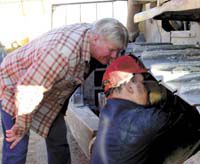| Ron Tweed and Stan Gibson inspect the tracks on heavy equipment at the county landfill. A piece of REBAR got caught in the tracks and wrapped around an axle. The county is considering an ordinance that may impact the job description for employees at the landfill. |
After a request to address the problem of excessive debris on Airport Road in Price, Carbon commissioners said Wednesday that the county plans to enact an ordinance designed to curb the number of unsecured loads hauled to the landfill.
At the regularly scheduled public meeting on Sept. 21, the commission instructed county attorney Gene Strate to draft an ordinance that would require loads hauled to the county landfill to be properly secured.
The request came from Harvey Howard the owner of Desert Thunder Raceway.
Howard explained that from the beginning of April to the end of September, organizers of the stock car races voluntarily clean the road between Utah Highway 55 in Price and the raceway.
Since the group has started the cleanup, race supporters have hauled away more than 240 truck loads of garbage.
Harvey pointed out that the debris on the side of the road is not just an eyesore for patrons of the race track.
In addition to the 4,000 or more entrants and spectators at the raceway, corporate executives and others who make decisions that impact local economy and government often fly into the county airport.
Howard pointed out that the first impressions that many of those individuals have as they enter the region is along Airport Road.
“The first thing they see is the garbage dump between Main Street and the garbage dump,” said Howard.
County Commissioner Mike Milovich suggested the commission consider an ordinance that would fine unsecured loads that are hauled along the road.
However, one of the individuals representing the raceway indicated that the laws regarding the hauling of unsecured loads are already in place.
The Utah code states: “A person may not operate a vehicle with a load on any highway unless the load and any load covering is fastened, secured and confined to prevent the covering or load from becoming loose, detached or in any manner a hazard to the safe operation of the vehicle or to other highway users.”
The code further indicates that failure to comply with the law is prosecutable as a class B misdemeanor.
The maximum penalty for a class B misdemeanor is six month imprisonment and a fine totaling $1,000.
However, in the case of unsecured loads, that amount is often reduced and no jail time is sentenced.
Since the laws are already in place, the commission considered the possibility of fining individuals who arrive at the landfill with an unsecured load. Milovich indicated that other cities have similar laws that require a higher fee per pound of refuse for anyone with an unsecured load.
Since Carbon County has no fee for using the landfill, Milovich suggested that the county consider imposing a flat fee for unsecured loads.
The commissioner suggested that a fee of $10 to $25 would be appropriate.
Strate pointed out that there may be some legal requirements if the county were to adopt such an ordinance. The county landfill workers are not currently in a position to accept such a fee, as none are authorized to handle or accept public funds. None are peace officers and, therefore, cannot issue a citation.
In addition, the question came up of whether the county could require landfill users to pay a fee. Those people with unsecured loads could choose not to use the dump and leave the premises.
Howard indicated that some county residents may already be doing that. Referencing the piles of garbage left on the sides of the road, he said that not all the garbage along Airport Road is debris that is blown off the top of unsecured vehicles. Rather, some people are dumping entire loads of garbage at various locations along the road. Howard said he suspected some of that may be the result of people arriving at the dump after it closes and choosing to illegally dump their garbage at another location.
Milovich suggested the county doesn’t need to stop people from leaving. Instead, dump employees could be instructed to record the license number, vehicle information and driver description of anyone who refuses to pay the fee.
County sheriffs could then be called to issue a citation to the driver for and the illegally transported load.
One member of the audience suggested that the county start with a warning period of a few weeks or a month.
“There’s not a person in the world that doesn’t know that dropping stuff on the highway is illegal,” said Milovich. He continued that a warning is not as effective as a monetary penalty.
The commission finally instructed Strate to draft an ordinance that would impose a fee on unsecured loads that arrived at the dump. The matter is scheduled to be addressed by the commission at its next meeting.
In addition, Sheriff James Cordova said his department would patrol the road and issue citations for unsecured loads, illegal dumping and similar infractions where necessary.
Cordova said that previous efforts to patrol the region had reduced the amount of illegal dumping. He said he hopes increased enforcement may help do that again.

